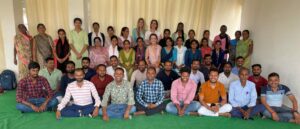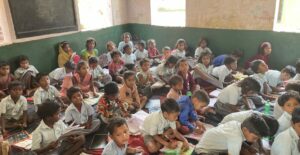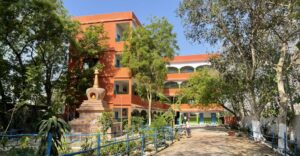During the pandemic, it was almost impossible to do an audit for our past and present projects in the field. This April, Shining Hope visited Shanti India School, the Alice Project School, and Karuna Shechen Mobile Clinics and Education Centre – all in the state of Bihar.
Bihar is the poorest and least developed state in India, with a population of 80 million, 40% of which live in poverty. The city of Bodhgaya is one of the four most important Buddhist pilgrimage sites, yet, its inhabitants, primarily agricultural workers, live in the hope that one day they will see the levels of illiteracy, malnutrition, and poverty going down. Even though the devotion to Buddhism led to the fast construction of multiple temples, monasteries, and hotels in Bodh Gaya, the surrounding villages are in extreme misery and poverty. Some households have to survive without a constant supply of water and electricity during the day, without schools, health centres, and sometimes even roads. Bihar has remained the poorest, most backward state since 1990, where people are bound to leave for better pay and opportunities. It provides other states of India with a flow of migrant workers – for instance, many rickshaw drivers come from Bihar.
One of the biggest problems in Bihar is illiteracy and a poor educational system. According to the Ministry of Education, Bihar has the lowest literacy rate in India at around 60%. However, after visiting different places around the state, it became clear that the situation is much worse – most people living in rural areas do not know how to read or write. Only 20% of secondary school students will go on to technical and vocational studies or university, with an apparent disparity between boys and girls. The latter chooses to stay home or marry according to the family’s wishes and social pressure.
The quality of public schooling in Bodhgaya and its villages is exceptionally inadequate. Endemic teacher absenteeism is a significant factor in educational failure. Even when teachers are present, only half of them take their job seriously with the intention of bringing knowledge to the students. According to the villagers, the teachers go to ‘clock in’ once a week to continue receiving their salaries while having another job on the side. The high level of corruption and negligence allows the schools to function poorly for decades without a change. Since most public schools in Bodhgaya work as daycare centres where children come only to socialise and have a meal, it has become a struggle for anyone to receive a high-quality education, especially in rural areas.
Shanti India School
Our current project in Bihar is Shanti India School – the school supports 700 of the most disadvantaged children and adolescents from the Bodhgaya area and provides free-of-charge full-time education for kindergarten to grade ten students. Our visit aimed to see the new school building that Shanti India constructed with the help of Shining Hope and other donors. In 2023, Shining Hope has been covering the salaries of 45 teachers and staff members in the school. Shanti India School has one teacher for every 30 students who benefit from a personalised follow-up. Each year a meeting is held for students in grades 10, 11, and 12 to advise them on their future educational plans. And against the tradition that a child of a low caste does not escape their fate, children are encouraged to believe in a better future and their ability to build it. After speaking with the parents and the staff, we realised that for most families living in Bodhgaya who cannot afford an education in a private school, Shanti India is the only chance to change the lives of local children and not let them share the fate of their underprivileged parents.

Karuna Shechen Mobile Clinics and Education Centre
From 2013 to 2015, Shining Hope was privileged to work with Karuna Shechen and support Bihar’s educational and medical centres. Once created by Matthieu Ricard, Karuna Shechen started its humanitarian journey in India from Bodhgaya, rising from a handful of villages around the city to 300 villages in the poorest areas of the Gaya, Nawada, and Aurangabad districts. In addition to the projects we supported in the past, Karuna Shechen has diversified projects responding to Bihar’s problems: fighting air pollution by planting trees along roads, keeping cultivation possible by building rainwater reserves, empowering women by training them as electric rickshaw drivers, encouraging food diversification by establishing kitchen gardens, offering advice on the state of farm animals by sending a vet to the remote villages, and supporting the community by organising IT and dressmaking courses.

The Alice Project School
The Alice Project is one of the past projects that Shining Hope visited during the recent trip to Bihar. More than a thousand students of different ages are receiving the Alice Project training in India in three schools – an innovative programme focusing on children’s education and developing their rational, emotional, and intuitive intelligence. The school in Bihar was entirely built with the help of Shining Hope after our previous visit to India almost ten years ago when we explored the concept of a similar school in Varanasi and wanted to bring the same opportunity to the villages of Bihar. Currently, the school provides an education for up to 300 children aged between 6 and 18, with ten full-time teachers. Access to technology allows students to connect with teachers from the other two schools via video calls and follow the lessons remotely if special assistance on some topics is needed. This year, the project is also constructing a hostel to accommodate students who will be coming from remote areas.

Nelson Mandela was right when he said that education is the most powerful weapon to transform the world, but for the Biharis, it is, most of all, a tool to bring a change to their families and break out of poverty. Shining Hope believes that quality education is a human right, which is why we have continued supporting educational projects in Bihar for over a decade.








